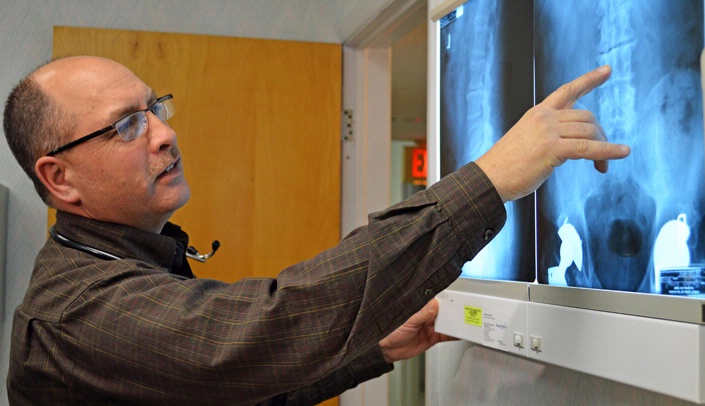UNMC’s Division of Physician Assistant Education, within the College of Allied Health Professions, has as part of its mission that it will produce PAs who will serve in rural areas.
Michael Huckabee, Ph.D., director of the division of PA education, said it is gratifying to see a recent national study which proves UNMC is meeting that mission.
The Rural Health Research Center, of the Federal Office of Rural Health Policy, found that UNMC ranks 10th nationally in number of graduates in rural locations, among PAs who graduated from 2000-2012. UNMC produced 143 graduates during that time who went on to rural locations.
The study found that about 10 percent of the nation’s programs produce more than a third of U.S. rural physician assistants.
It also found that two major factors came into play in programs producing rural PAs: mission, like UNMC’s, and location, the program itself being in a rural area.
Dr. Huckabee said UNMC has done well, perhaps in spite of its metro Omaha location. He hopes with classes of PAs now also based out of the Health Science Education Complex in Kearney, numbers of those who go on to serve in rural areas may even be higher.
Dr. Huckabee said he believes UNMC’s Rural Health Opportunities Program (RHOP), in partnership with Nebraska’s state college system, has been crucial to producing PAs and other health professionals who go on to practice in rural Nebraska.
“It is a pipeline,” Dr. Huckabee said. “It is part of our commitment that we do engage that mission, we want to grow that mission and we believe we are meeting that mission.”
Now, UNMC possesses the data that proves it.
Additionally, UNMC’s PA program is taking deliberate measures to show students the value of serving in rural environments. While most PA clinical rotations are one month long, UNMC’s rural, family-practice rotation lasts for three months, Dr. Huckabee said.
“Our students experience what it’s like to practice in a rural area, the uniqueness of a rural environment,” Dr. Huckabee said. “They see the continuity of care, engaging in the types of relationships that are found among neighbors and community members in rural communities.
“They will not only follow up in their clinical care, but see those people in the community and live life with them.”
That type of lifestyle may be difficult to communicate in mere words, Dr. Huckabee said, “But once a student experiences it, some may say, ‘Yeah, that’s me.’ “
